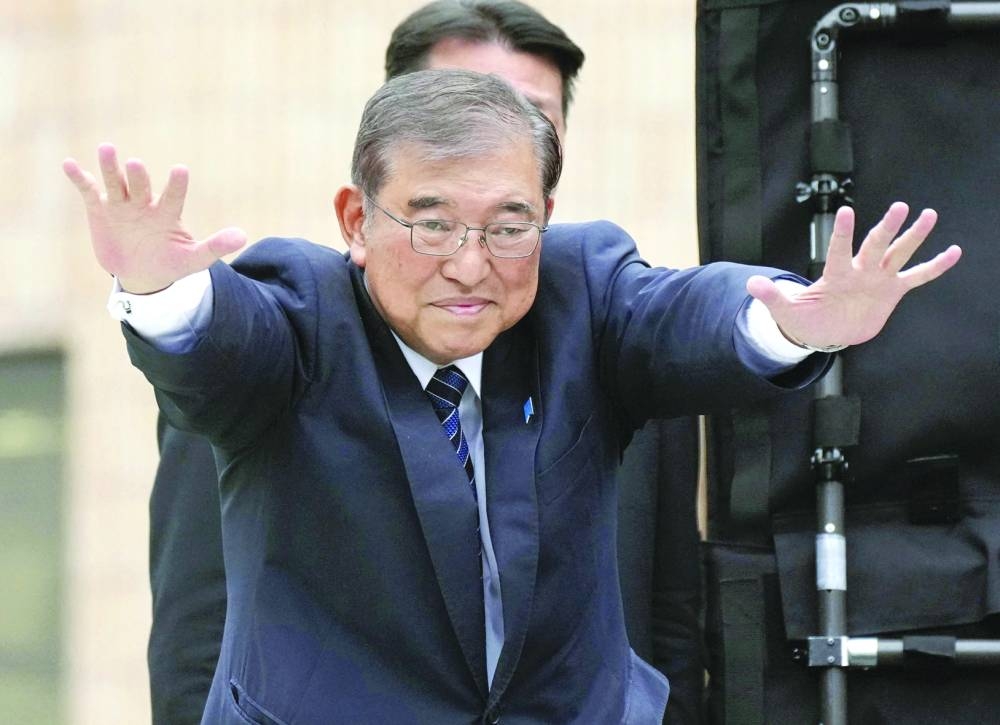Candidates in Japan’s super-tight election made last-ditch appeals to voters yesterday, with opinion polls suggesting the ruling coalition might fall short of a majority. Such a bombshell outcome in today’s vote would be the worst result for the Liberal Democratic Party (LDP) since 2009, and potentially a knockout blow to Prime Minister Shigeru Ishiba.
Ishiba — a fan of trains, 1970s pop idols and making model ships and planes — only last month took the helm of the LDP, which has governed Japan for almost all of the past seven decades. After a tough internal contest, the 67-year-old former defence minister became premier on October 1. Days later, he called the snap parliamentary elections, promising a “new Japan”.
Ishiba pledged to revitalise depressed rural regions and to address the “quiet emergency” of Japan’s falling population through family-friendly policies such as flexible working hours. But he has since rowed back his position on issues including allowing married couples to take separate surnames.
He also named only two women ministers in his cabinet. Rising prices have rankled voters, and also dogging Ishiba is the fallout from a party slush fund scandal that helped sink his predecessor, Fumio Kishida.
A poll on Friday by the Yomiuri Shimbun daily suggested that the LDP and its coalition partner Komeito might struggle to get the 233 lower house seats needed for a majority.
Ishiba has set this threshold as his objective, and missing it would undermine his position in the LDP and mean finding other coalition partners or leading a minority government. Local media speculated that Ishiba could potentially even resign immediately to take responsibility, becoming Japan’s shortest-serving prime minister in the post-war period.
The current record is held by Naruhiko Higashikuni who served for 54 days – four days more than British leader Liz Truss in 2022 – just after Japan’s 1945 defeat in World War II. “The situation is extremely severe,” Ishiba reportedly said on the stump Friday. But at a rally yesterday, he made a fresh promise of renewal to hundreds of supporters. “We want to start afresh as a fair, just and sincere party, and seek your mandate,” he said.
In many districts, LDP candidates are in neck-and-neck battles with those from the Constitutional Democratic Party (CDP) – the second-biggest in parliament – led by popular former prime minister Yoshihiko Noda. “The LDP’s politics is all about quickly implementing policies for those who give them loads of cash,” Noda said at a rally yesterday.
“But those in vulnerable positions, who can’t offer cash, have been ignored,” he added, accusing the LDP-led government of offering insufficient support for survivors of an earthquake in central Japan.
Noda’s stance “is sort of similar to the LDP’s. He is basically a conservative,” Masato Kamikubo, a political scientist at Ritsumeikan University, told AFP. “The CDP or Noda can be an alternative to the LDP. Many voters think so,” Kamikubo said.
Ishiba promised to not actively support LDP politicians caught up in the funding scandal running in the election, although they are still standing. According to media reports, the party has also provided 20mn yen ($132,000) each to district offices headed by these figures.
“It is truly frustrating that such reports come out at a time like this,” Ishiba said in a campaign speech on Thursday. “Those candidates will not use the money.” “We cannot be defeated by those with biased views,” he added. Hitomi Hisano, an undecided voter from the central Aichi region, told AFP in Tokyo that the LDP’s funding scandal was a big factor for him. “The LDP has sat in power for too long. I see hubris in there,” the 69-year-old said. “So part of me wants to punish them.”

Japan’s Prime Minister Shigeru Ishiba, leader of the Liberal Democratic Party, gestures at a campaign event in Tokyo.
